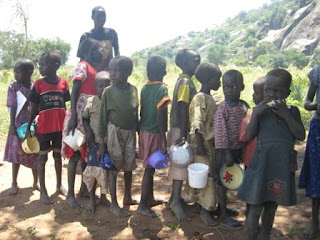Cattle Raiders Killed Two Widows
Two Active members of Women of Hope Mission (WHOM) were shot by cattle raiders on their way to fetch water. The ladies had also lost their husbands in the same way-through the barrel of guns. One of the victims was Susan Okore. Her husband was killed 2004; in 2008 she remarried to a brother of her late husband Hillary. Okore left behind five children, the youngest is 3 months old.
The second victim, Icerer Oloi, lost her husband last October in the same circumstances. She did not remarry until her brutal death on June 3th, 2011. She left behind four children. The youngest child is four years old. Inter and Intra tribal cattle raiding in eastern Equatoria State (EES)between members of the Otuho, Boya, Logir, Toposa, Lopit and other ethnic groups killed a great number of young men and women. Of recent, the number of women killed has tremendously increased. There have been numerous raids, but this is the most violent of the other major incidents since the signing of the Comprehensive Peace Agreement (CPA) in 2005. For the second time WHOM has lost all 8 trained oxen in the hands of warriors.
The CPA was signed by North and South Sudan in 2005, ending 22 years of civil war. South Sudan was officially declared an independent country in July. Bringing cattle raiding attacks under control will be a significant challenge for the new country. This cattle raiding should not be ignored because the raiders are well armed. These guns were gotten during the civil war.
Last February, conflict erupted in Budi County between police and local residents of Boya ethnic group (pastoralists). The state government responded by requesting assistance from Torit, the capital of Eastern Equatoria State (EES). The governor of Eastern Equatoria State, Louis Lobong Lojore has made repeated requests to the ethnic groups in the state to maintain peace and involve in other better productive ways of survival. There is an observation that police force is needed to be well-trained so that they are better prepared to deal with insecurity, particularly cattle raiding.
Competition between South Sudan ethnic groups over scarce resources continues to spark violence, often in the form of deadly cattle-raids. Some minority groups and ex-combatants feel that their interests are not being represented within the political system, and that resources have been diverted to individuals and more populous ethnic groups. In most parts of the ten states of South Sudan poverty can be identified as one of the main factors exacerbating existing cattle raiding. Violent incidences are more increased during dry seasons, where cattle herding communities clash over same water points and existing grasslands. As such, Evangelical Church of South Sudan (ECSS) appeals to Christian Community all over the world to drill boreholes and build water catchments that will ensure more access to water points by herders as a mechanism to reduce tension among the pastoralists. If the people of South Sudan can feed themselves and even sell some vegetables in the market, they will not be so dependent on food aid or on raising cattle. This cut down on the existing violence. Pray with us on how we can help this situation.
An Appeal: In Eastern Equatoria State alone, there are over 90,000 vulnerable orphans. We will appreciate all of our friends who will help us top care for very few most vulnerable precious orphans. Deut. 24:19, 20, 21. FEED THESE ORPHANS! Pray and act! Send support for the ministry to: WorldVenture, get details for fund acct # on this blog
DOMINIC & REJOICE OLLURU












